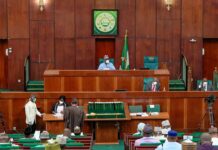Your worries about why Nigeria’s debt ahs been on the increase has been addressed by the Debt Management Office (DMO).
‘Biting more than you can chew’ seems to be one of the major problems of Nigeria, when it comes to her finance.
Borrowing is not the biggest problem facing Nigeria, but debt servicing is.
Read Also: Xavi BLASTS Barcelona Squad After El Clasico Mauling
“What triggers debts and why debt stock keeps growing is that when the debt stock is growing, debt service also grows”, the Director-General of Debt Management Office (DMO), Patience Oniha, said.
She made this revelation while speaking on a national television on Wednesday.
Nothing Wrong With Borrowing
According to the DMO boss, several loans had been contracted from multilateral and bilateral sources, while at the same time, the Federal Government keeps issuing promissory notes to settle obligations for which it does not really have the revenue back up.
She described promissory as a legal instrument, in which one promises to pay a sum of money at a fixed future time or on demand of the payee, under specific terms.
Oniha explained that there was nothing wrong with borrowing, if revenue was generated to support such borrowing.
According to her, debt can be surmounted if incentives are put in place to ensure borrowings equal balanced expenditure and sustained revenue.
“There are new borrowings for the budget, states and Federal Government will borrow, ways and means will be approved and all,” she said, adding that Nigeria’s debt stock is ₦46.25 trillion.
It includes the debts of the 36 state governments and the Federal Capital Territory (FCT). The Federal Government is responsible to 85% of this.
You May Also Read: Foreign Capital Importation Declined By 20.47% -NBS
“The debt stock is growing because Nigeria has been running a budget deficit for many decades.’’
Running Budget Deficits
Oniha said: “In good and bad times with oil prices, we have borrowed. We have been running budget deficits and those deficits are funded largely by 85% to 95% from borrowing and that is cumulative. These are publicly available data.
“As we borrow each year, it adds up, so the annual budget deficits are a major component. If you look at this year’s budget, the budget size is ₦21 trillion, borrowing is ₦10 trillion.
The third part – the government has been issuing promissory notes to settle obligations for which it doesn’t really have the revenue.
“So, that is why the debt stock has been growing,” she explained.
Oniha added that Nigeria had contracted several loans in the past from multilaterals, like the World Bank, the African Development Bank and bilateral like Germany, India, China, saying disbursements are going on.
Best Way Out
However, Oniha said Nigeria’s total debt to Gross Domestic Product (GDP) is lowest in Africa.
“Our debt to GDP as at December 2022 was 23% and that is still within the limit the government set for itself and the 55% set by the World Bank and International Monetary Fund (IMF).
“If we add the ways and means, it increases to about 40%”.
“The challenge is debt service to revenue and Nigeria has 6.7% ratio revenue to GDP,” she said, highlighting that the “best way out is to reduce the level of borrowings and improve revenue at all costs”.






